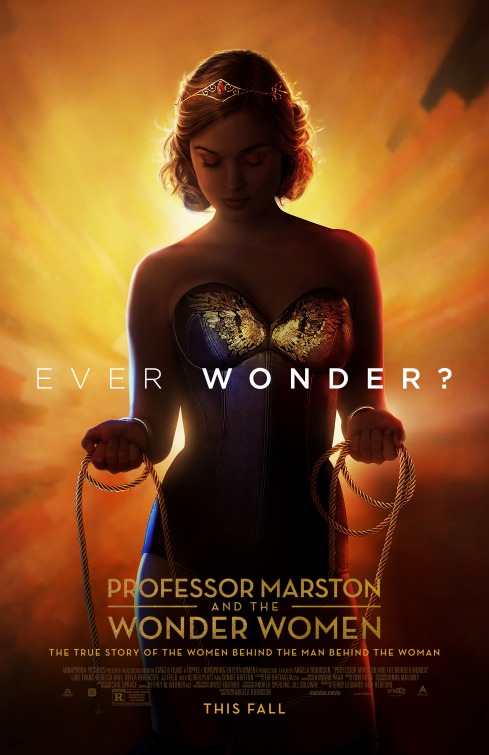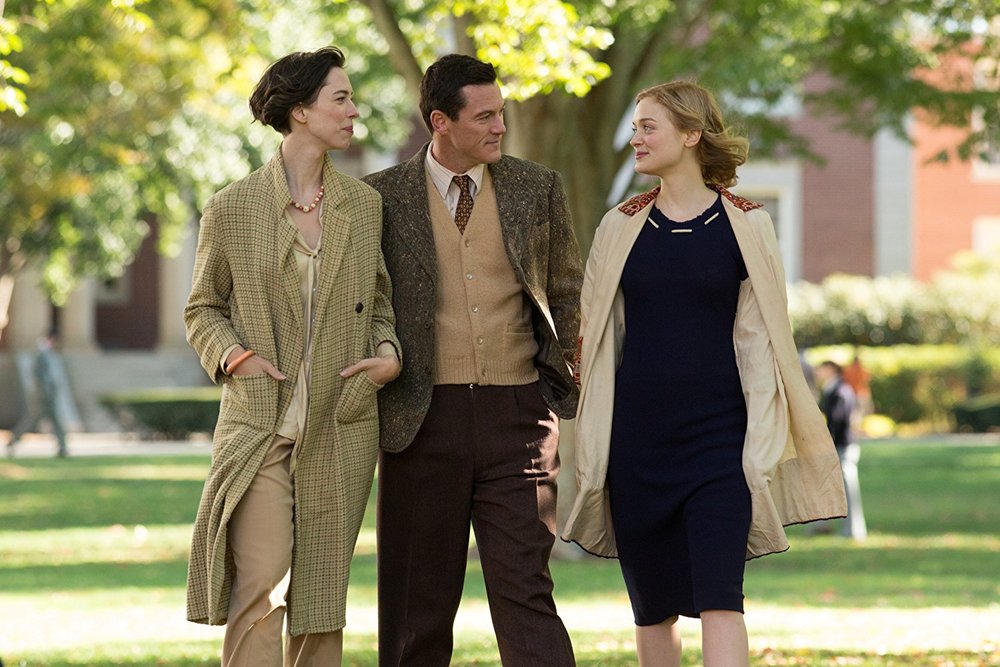Professor Marston And The Wonder Women (2017)


SHOULD I SEE IT?
YES
The actual story behind the creation of Wonder Woman is provocative, surprising, and makes for one of the more fascinating movies of 2017.
Look, we dropped $412 million on Wonder Woman earlier this year. Though this very much earns its R rating, fans should give it a look.
Among a great ensemble of actors, Rebecca Hall gives one of 2017's finest performances as an emotionally conflicted wife, wrestling with emotions old and new.
NO
This. Is. Not. For. Kids. Very adult and populated with very grown-up subject matter, Professor Marston is an origin story for the 17-and-older crowd.
This movie is going to ruffle the feathers of more conservative moviegoers. Requires an open mind. If you can't provide that, look elsewhere.
Glosses over or rushes through some pretty significant emotional beats that play as trivial on screen, but clearly could not have been and were not to the real people involved.
OUR REVIEW
Professor Marston and the Wonder Women tells a bold and provocative story about psychologist and college professor William Moulton Marston (Luke Evans), and the behind-the-scenes realities which led to his conceiving of, and authoring of, an initial run of comic books, introducing his creation, Wonder Woman, to readers of all ages in the 1940s.
Prior to that, years before, Marston claimed to be the inventor, along with wife Elizabeth (Rebecca Hall), of the first-ever legitimate polygraph, or lie detector machine. The Marstons found that when a participant in the test told a lie, their systolic blood pressure would change, measured by a bar which wrapped around the chest of the individual receiving the test. Wonder Woman fans may recall that the superhero brandishes a lasso, which when wrapped around the chest of a foe, compels them to tell the truth.
However, other reasons are in play, when children's author and psychologist Josette Frank (Connie Britton) grills Marston over the themes and concepts found in his comic book series in the mid-1940s. In flashback, we learn how Marston worked as a college professor and researcher, alongside his wife, selling his DiSC theory, positing that people express human emotions in four types of ways, through Dominance, Inducement, Submission, and Compliance.
Written and directed by Angela Robinson, Professor Marston gets the unconventional structure of the story out of the way early on when Marston becomes instantly attracted to Olive Byrne (Bella Heathcote), a new student taking one of his classes. While he enjoys an open marriage with Elizabeth, we get the sense that neither have ever acted upon it, and it is with some lustful optimism that the Marstons agree to offer Olive an internship for their research projects.
After great resistance and some badly handled interactions at the start, the three discover a breakthrough, not only with the lie detector, but with one another.
Robinson covers a lot of ground before we ever get to the creation of Wonder Woman. Forming a polyamorous relationship, Marston, Elizabeth, and Olive fall in love with one another and attempt to create a life together - a life they naturally must keep hidden away from others.
They become careless, people find out and reputations and careers are placed in peril. Yet they forge ahead, together, and create a family which exhibits a loving, organic, heartfelt, and pure connection. Robinson theorizes, and some viewers will reject this notion straightaway, that Olive brought Marston and his wife closer emotionally. Along the way, however, the movie intimates that Olive perhaps loved Elizabeth the most of all.

Nods and winks to the Wonder Woman franchise are sprinkled in along the way. Marston sunk everything he had financially and creatively into the creation of his superhero. He incorporated everything from the fashion choices and personality traits of Elizabeth and Olive into his stories, but also utilized memories of time spent together, as well as carnal fetishes and desires the trio explored. Josette Frank's uncomfortable nature with the subject matter calls to mind a growing belief in today's social media world that teenagers and kids see too much, too early and too often. In the mid-1940's we see Marston push back hard on this criticism, believing his comic book is empowering, confident, and important.
Of the main cast, Rebecca Hall is exceptional, her Elizabeth wrestling and grappling with emotions and beliefs she suppressed and never allowed herself to believe possible as she devoted her life to Marston and her career. The actress, who tore the house down in 2016's acclaimed but little-seen Christine, is impossible to ignore - her blunt vulnerability and impulsive decision-making a powerful force in the world of the idealistic Marston and sweet-tempered and tender-hearted Olive.
Heathcote's performance as Olive is impressive and bold, a breakout of sorts for the young actress, while Evans is dialed in as the eccentric, impassioned Marston. Once she builds the scaffolding, Robinson doubles down time and again on the connection between Olive and Elizabeth, the proverbial Wonder Women behind this story.
Not everything clicks, and especially in moments where Robinson eyeballs more of the salacious elements of the relationship. Along with some beautifully shot and properly intense love scenes, we endure a spanking ritual at Olive's sorority, which proves campy and silly. Later, a sequence built around a bizarre lingerie dealer, who stokes Marston's curiosities with such clothing, devolves into a voyeuristic tryst with ropes, light bondage, and some rather surprising symbolism.
Bryce Fortner's lensing is exquisite, and the film benefits from terrific costuming and art direction, with Robinson's script paying proper respect to the moments which inspired Marston to create one of the most iconic superheroes of all time. The film is loving, somewhat in awe of Olive and Elizabeth, and implores a message of acceptance, offering a love story in an open and affirming way.
Frequently I found myself smiling, appreciative of yet another film contributing to what is turning out to be a significant year for women at the box office.
Requiring an open mind, Professor Marston and the Wonder Women is a delightful film, one of the better surprises of 2017. And we don't deserve Rebecca Hall. If there is any justice in the world, she will surface in the awards conversations at the end of the year. Her searing gaze, take charge attitude, and heart-on-the-sleeve honesty as Elizabeth, easily among the year's finest work.
CAST & CREW
Starring: Luke Evans, Rebecca Hall, Bella Heathcote, Connie Britton, JJ Feild, Chris Conroy, Oliver Platt, Maggie Castle, Monica Giordano.
Director: Angela Robinson
Written by: Angela Robinson
Release Date: October 13, 2017
Annapurna Pictures
